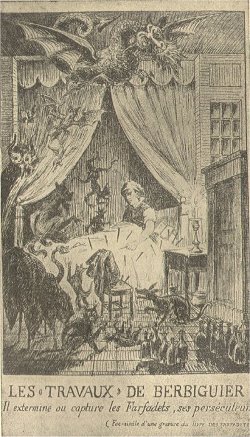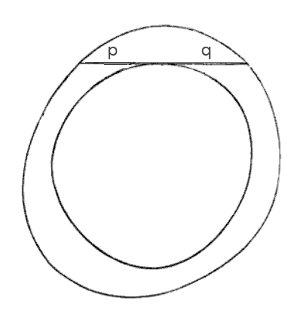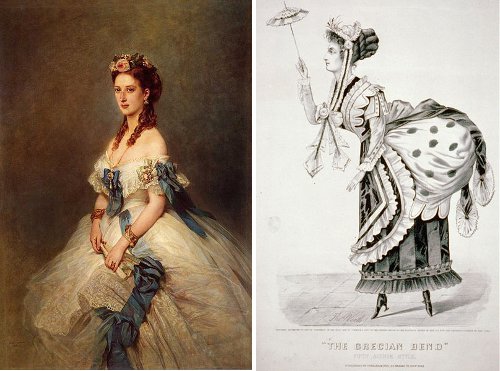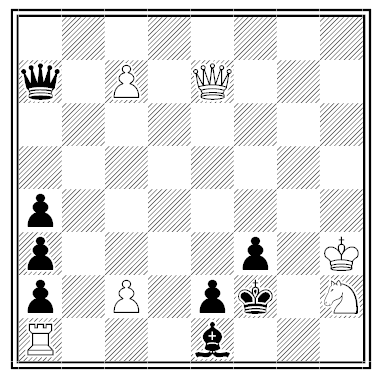Month: April 2011
A Man Possessed

Alexis Vincent Charles Berbiguier was beset by imps — not metaphorically, but (to his mind) quite literally. Born in 1764, the French nobleman was plagued from his youth by what he called farfadets or goblins, led by an agent of Beelzebub named Rhotomago. Using brushes, pins, sponges, and snuff, he worked out a method to trap the imps in bottles, but they were legion. His 1821 autobiography recounts his plight:
I have suffered much, and am still suffering. For twenty years demons, sorcerers and farfadets have not allowed me a moment’s rest: everywhere they pursue me: in the town and country, in church and at home, and even in my bed. My head is sound, and no defect mars the good condition of my body. I am made in the image of our Saviour. Why, then, have I been chosen as the principal victim?
Convinced that he had been chosen by God to exterminate these agents of evil, he pleaded his case resolutely to all who would listen. “These brushes, gentlemen,” he told one courtroom, “contain the souls of the hobgoblins who came to attack me last night. Look at this bottle — well, it contains millions of hobgoblins. Oh, laugh as long as you like, but, were it not for me, you would not be so much at your ease, nor even the judges upon the bench.”
Berbiguier lived out his life in this belief, keeping increasingly to himself and suspicious of those who tried to help. But he never conquered the imps. In a way his failure was heroic — delusions they may have been, but their victims’ torture was real.
“Wills Against Moustaches”
Mr. Tegg, in his curious and interesting volume, Wills of Their Own, quotes two testators whose aversion to moustaches continued to exhibit itself even after death. The will of Mr. Henry Budd, which came into force in 1862, declared against the wearing of moustaches by his sons in the following terms: ‘In case my son Edward shall wear moustaches, then the devise herein before contained in favour of him, his appointees, heirs, and assigns, of my said estate called Pepper Park, shall be void; and I devise the same estate to my son William, his appointees, heirs, and assigns. And in case my said son William shall wear moustaches, then the devise hereinbefore contained in favour of him, his appointees, heirs, and assigns of my said estate, called Twickenham Park, shall be void; and I devise the said estate to my said son Edward, his appointees, heirs, and assigns.’
Another instance is the will of Mr. Fleming, an upholsterer of Pimlico, proved in 1869, who left £10 each to those of the men in his employ who did not wear moustaches. Those who persisted in wearing them to have only £5 each.
— Jacob Larwood, Forensic Anecdotes, 1882
Holditch’s Theorem

Cut a notch in a stick and label the two parts p and q. Then draw the stick around the shore of a pond. The notch will describe a curve, and, remarkably, the area between the shore and this curve will be given by πpq.
“Two things immediately struck me as astonishing,” wrote British mathematician Mark Cooker in 1988. “First, the formula for the area is independent of the size of the given curve. Second, [the equation for the area] is the area of an ellipse of semi-axes p and q, but there are no ellipses in the theorem!”
Unquote
“In quarrelling the truth is always lost.” — Publilius Syrus
Pasted Praise
This “parable against persecution” was a favorite of Benjamin Franklin, who would sometimes pretend to recite it out of a Bible as “the 51st chapter of Genesis.” He wrote that “the remarks of the Scripturians upon it … were sometimes very diverting”:
1. And it came to pass after these things, that Abraham sat in the door of his tent, about the going down of the sun.
2. And behold a man, bowed with age, came from the way of the wilderness, leaning on a staff.
3. And Abraham arose and met him, and said unto him, ‘Turn in, I pray thee, and wash thy feet, and tarry all night, and thou shalt arise early on the morrow, and go on thy way.’
4. But the man said, ‘Nay, for I will abide under this tree.’
5. And Abraham pressed him greatly; so he turned, and they went into the tent; and Abraham baked unleavened bread, and they did eat.
6. And when Abraham saw that the man blessed not God, he said unto him, ‘Wherefore dost thou not worship the most high God, creator of heaven and earth?’
7. And the man answered and said, ‘I do not worship the God thou speakest of; neither do I call upon his name; for I have made to myself a God, which abideth alway in mine house, and provideth me with all things.’
8. And Abraham’s zeal was kindled against the man; and he arose, and fell upon him, and drove him forth with blows into the wilderness.
9. And at midnight God called unto Abraham, saying, ‘Abraham, where is the stranger?’
10. And Abraham answered and said, ‘Lord, he would not worship thee, neither would he call upon thy name; therefore have I driven him out from before my face into the wilderness.’
11. And God said, ‘Have I borne with him these hundred ninety and eight years, and nourished him, and clothed him, notwithstanding his rebellion against me; and couldst not thou, that art thyself a sinner, bear with him one night?’
12. And Abraham said, ‘Let not the anger of my Lord wax hot against his servant; lo, I have sinned; forgive me, I pray thee.’
13. And Abraham arose, and went forth into the wilderness, and sought diligently for the man, and found him, and returned with him to his tent; and when he had entreated him kindly, he sent him away on the morrow with gifts.
14. And God spake again unto Abraham, saying, ‘For this thy sin shall thy seed be afflicted four hundred years in a strange land;
15. ‘But for thy repentance will I deliver them; and they shall come forth with power, and with gladness of heart, and with much substance.’
(In reality it’s thought to have originated with the Persian poet Saadi.)
Hot

Smokey Bear had his own zip code.
At the height of his fame at the National Zoo he received 5,000 letters a week.
Posturing

“Almost all absurdity of conduct,” wrote Dr. Johnson, “arises from the imitation of those whom we cannot resemble.”
When a bout of rheumatic fever in 1867 left the Princess of Wales with a limp, London society ladies began to copy her gait. This grew so popular that it became known as “the Alexandra limp.”
The affectation was widely derided — John Stephen Farmer called it “an erstwhile fit of semi-imbecility” by “a crowd of limping petticoated toadies” — but it was followed almost immediately by the “Grecian bend,” in which ladies began stooping forward from the waist. Albert Jones Bellows described a sighting in Boston:
She waddled a few rods past the store, and then turned round, smiling, or rather smirking, complacently on her ‘crowd of admirers,’ with an expression of face which seemed to say, … ‘All my torture is repaid by the admiration I excite.’ And I wanted to quote the apostrophe of Burns to the louse:–
‘O, wad some power the giftie gie us
To see oursels as ithers see us!
It wad frae monie a blunder free us
An’ foolish notion:
What airs in dress an’ gait wad lea’e us,
And e’en devotion!’
Knot Mirage
For years Raymond Smullyan sought a “metaparadox,” a statement that is paradoxical if and only if it isn’t. He arrived at this:
Either this sentence is false, or (this sentence is paradoxical if and only if it isn’t).
He wrote, “I leave the proof to the reader.”
Light Work
From Lewis Carroll:
I don’t know if you are fond of puzzles, or not. If you are, try this. … A gentleman (a nobleman let us say, to make it more interesting) had a sitting-room with only one window in it–a square window, 3 feet high and 3 feet wide. Now he had weak eyes, and the window gave too much light, so (don’t you like ‘so’ in a story?) he sent for the builder, and told him to alter it, so as only to give half the light. Only, he was to keep it square–he was to keep it 3 feet high–and he was to keep it 3 feet wide. How did he do it? Remember, he wasn’t allowed to use curtains, or shutters, or coloured glass, or anything of that sort.


